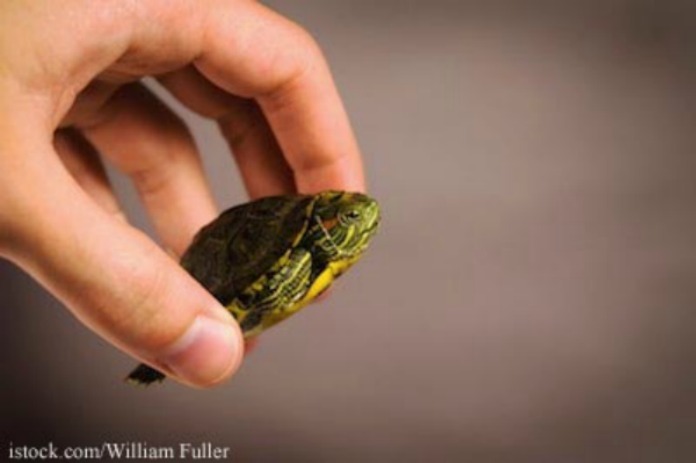The Centers for Disease Control and Prevention (CDC) has released information about a multistate outbreak of Salmonella Agbeni infections that are linked to pet turtles. As of August 29, 2017, there are 37 people sick in 13 states. Sixteen people have been hospitalized, which is a very high percentage for this type of outbreak.

Illnesses started on dates ranging from March 1, 2017 to August 3, 2017. Of 33 people who have been interviewed, 16 have been hospitalized. That hospitalization rate of almost 50% is more than double the usual rate of 22% for most Salmonella outbreaks. Twelve, or 32%, of ill persons are children under the age of 5. No deaths have been reported.
Epidemiologic and laboratory findings link the outbreak to contact with turtles or their environment, such as water from a turtle habitat. In interviews, 45% of the 33 people interviewed said they had contact with turtles or their environment before getting sick. In interviews with 9 ill persons about where their turtles came from, 6 said they purchased it from a flea market or street vendor, or received the turtle as a gift.
In 2015, state and local health officials collected samples from turtles that were being sold by a street vendor. Whole genome sequencing showed that the Salmonella Agbeni isolated from ill persons in this outbreak is closely related to the Salmonella Agbeni isolates from turtles.
Do not buy small turtles as pets or give them as gifts. Since 1975, the FDA has banned the selling and distributing turtles with shells less than 4″ long as pets because they are often linked to Salmonella infections. Young children are especially susceptible to these infections and to serious complications arising from the infection.
All turtles can carry Salmonella bacteria, even if they look clean and healthy. If you choose to keep reptiles as pets, follow some steps to protect your family. If you have young children, consider other types of pets. Always wash your hands thoroughly after handling reptiles and amphibians, and anything in the area where they live and roam. Children under the age of 5 and adults older than 65 sold never handle or touch these animals.
Beware of cross-contamination if you have an amphibian or reptile in your home. Any reptile food, such as frozen or live rodents, equipment, and materials, including tank water, can be contaminated with Salmonella and other pathogenic bacteria.
Keep reptiles and amphibians and their equipment and food out of the kitchen or anywhere food is prepared, served, or eaten. Clean the habitats outside your home. If you can’t do that, clean items in a dedicated bin or bucket with warm soapy water. And don’t kiss or snuggle these animals.
Remember to avoid turtles less than 4″ in length. This is about the size of a deck of cards or a cell phone. Federal law bans the sale of these animals. Don’t catch wild reptiles or amphibians and keep them as pets. And don’t release unwanted animals into the environment. If you do choose to have one of these animals as a pet, talk to your veterinarian to assess the type of commitment the animal needs.




